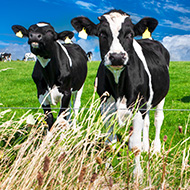Calls for clear strategy on intensive farming

Grants allocated under Animal Health and Welfare Pathway should be used for genuine improvement of animal welfare, Compassion says.
Compassion in World Farming has called for a clear strategy to tackle intensive animal farming.
The call follows an announcement from Defra on Thursday (26 January), setting out new details on subsidy schemes aimed at supporting farmers through the Environmental Land Management schemes (ELMs).
Among these include a range of paid actions to manage hedgerows for wildlife, plant nectar-rich wildflowers and control crop pests without using insecticides.
Environment Secretary Thérèse Coffey said: “Farmers are at the heart of our economy - producing the food on our tables as well as being the custodians of the land it comes from.
“These two roles go hand-in-hand and we are speeding up the roll out of our farming schemes so that everyone can be financially supported as they protect the planet while producing food more sustainably.”
In response, animal welfare organisation Compassion in World Farming welcomed the sustainable measures, but pointed out that they do not significantly enhance animal welfare in British farming.
Nick Palmer, head of Compassion in World Farming UK, explained: “While Compassion welcomes the further clarification of subsidy schemes available for farmers to incentivise measures that help protect soils and nature, what’s needed is a more coherent overall strategy that will deliver genuinely sustainable farming.
“These new measures will not significantly shift the dial to secure the rapid and far-reaching changes needed. To properly address the climate emergency by a strategic switch to regenerative farming.
With further measures set to be announced in the spring, Compassion is calling on the Government to ensure that the expansion of grants is used to fundamentally improve farmed animal welfare. This would include helping farmers move to farming systems not based on cruel intensive methods, such as the use of crates or cages.
Nick continued: “Defra has promised further details of the Animal Health and Welfare Pathway in the spring. If these grants are to deliver better welfare, as the name suggests, then it is essential that they support farmers in moving away from the worst examples of factory farming, by banning the use of cages for hens and farrowing crates for pigs.”



 The veterinary mental health charity Vetlife is inviting the veterinary community to join it for a sponsored cold-water dip.
The veterinary mental health charity Vetlife is inviting the veterinary community to join it for a sponsored cold-water dip.